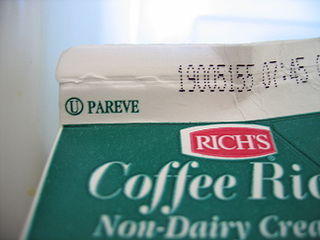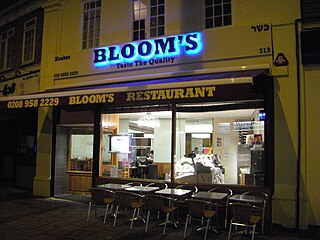Kashrut is a set of dietary laws dealing with the foods that Jewish people are permitted to eat and how those foods must be prepared according to Jewish law. Food that may be consumed is deemed kosher, from the Ashkenazi pronunciation of the term that in Sephardi or Modern Hebrew is pronounced kashér, meaning "fit". Food that may not be consumed, however, is deemed treif, also spelled treyf. In case of objects the opposite of kosher is pasúl
A hechsher or hekhsher is a rabbinical product certification, qualifying items that conform to the requirements of Jewish religious law.

A mashgiach or mashgicha is a Jew who supervises the kashrut status of a kosher establishment. Mashgichim may supervise any type of food service establishment, including slaughterhouses, food manufacturers, hotels, caterers, nursing homes, restaurants, butchers, groceries, or cooperatives. Mashgichim usually work as on-site supervisors and inspectors, representing a kosher certification agency or a local rabbi, who actually makes the policy decisions for what is or is not acceptably kosher. Sometimes certifying rabbis act as their own mashgichim; such is the case in many small communities.
Kosher foods are foods that conform to the Jewish dietary regulations of kashrut. The laws of kashrut apply to food derived from living creatures and kosher foods are restricted to certain types of mammals, birds and fish meeting specific criteria; the flesh of any animals that do not meet these criteria is forbidden by the dietary laws. Furthermore, kosher mammals and birds must be slaughtered according to a process known as shechita and their blood may never be consumed and must be removed from the meat by a process of salting and soaking in water for the meat to be permissible for use. All plant-based products, including fruits, vegetables, grains, herbs and spices, are intrinsically kosher, although certain produce grown in the Land of Israel is subjected to other requirements, such as tithing, before it may be consumed.

The Orthodox Union is one of the largest Orthodox Jewish organizations in the United States. Founded in 1898, the OU supports a network of synagogues, youth programs, Jewish and Religious Zionist advocacy programs, programs for the disabled, localized religious study programs, and international units with locations in Israel and formerly in Ukraine. The OU maintains a kosher certification service, whose circled-U hechsher symbol, U+24CAⓊCIRCLED LATIN CAPITAL LETTER U, is found on the labels of many kosher commercial and consumer food products.

In kashrut, the dietary laws of Judaism, pareve or parve is a classification of food that contain neither dairy nor meat ingredients. Food in this category includes all items that grow from the ground, fish, eggs, and non-biological edible items.

OK Kosher Certification is a major kosher certification agency based out of Brooklyn, NY. It is one of the "Big Five," the five largest kosher certifying agencies in the United States. OK also has a large kosher presence in Asia.

Kosher style refers to Jewish cuisine—most often that of Ashkenazi Jews—which may or may not actually be kosher. It is a stylistic designation rather than one based on the laws of kashrut. In some U.S. states, the use of this term in advertising is illegal as a misleading term under consumer protection laws.

The Islamic dietary laws (halal) and the Jewish dietary laws are both quite detailed, and contain both points of similarity and discord. Both are the dietary laws and described in distinct religious texts: an explanation of the Islamic code of law found in the Quran and Sunnah and the Jewish code of laws found in the Torah, Talmud and Shulchan Aruch.

Triangle K is a kosher certification agency under the leadership of Rabbi Aryeh R. Ralbag. It was founded by his late father, Rabbi Yehosef Ralbag. The hechsher is a letter K enclosed in an equilateral triangle.
The Franklin Prophecy, sometimes called the Franklin Forgery, is an antisemitic speech falsely attributed to Benjamin Franklin, warning of the supposed dangers of admitting Jews to the nascent United States. The speech was purportedly transcribed by Charles Cotesworth Pinckney during the Constitutional Convention of 1787, but was unknown before its appearance in 1934 in the pages of William Dudley Pelley's Silver Legion pro-Nazi magazine Liberation. No evidence exists for the document's authenticity, and some of Pelley's claims have actively been disproven.
Antisemitic tropes, also known as antisemitic canards or antisemitic libels, are "sensational reports, misrepresentations or fabrications" about Jews as an ethnicity or Judaism as a religion.
Magen Tzedek, originally known as Hekhsher Tzedek, is a complementary certification for kosher food produced in the United States in a way that meets Jewish Halakhic (legal) standards for workers, consumers, animals, and the environment, as understood by Conservative Judaism. Magen Tzedek certification is not a kashrut certification which certifies that food is kosher in that it meets certain requirements regarding ingredients of food and technical methods of animal slaughter, but an ethical certification complementary to conventional kosher certification.

A kosher restaurant or kosher deli is an establishment that serves food that complies with Jewish dietary laws (kashrut). These businesses, which also include diners, cafés, pizzerias, fast food, and cafeterias, and are frequently in listings together with kosher bakeries, butchers, caterers, and other similar places, differ from kosher-style businesses in that they operate under rabbinical supervision, which requires the observance of the laws of kashrut, as well as certain other Jewish laws, including the separation of meat and dairy.
Eco-Kashrut, also called the Eco-Kosher movement, is a movement to extend the Kashrut system, or Jewish dietary laws, to address modern environmental, social, and ethical issues, and promote sustainability.
A kosher certification agency is an organization or certifying authority that grants a hechsher to ingredients, packaged foods, beverages, and certain materials, as well as food-service providers and facilities in which kosher food is prepared or served. This certification verifies that the ingredients, production process including all machinery, and/or food-service process complies with the standards of kashrut as stipulated in the Shulchan Arukh, the benchmark of religious Jewish law. The certification agency employs mashgichim to make periodic site visits and oversee the food-production or food-service process in order to verify ongoing compliance. Each agency has its own trademarked symbol that it allows manufacturers and food-service providers to display on their products or in-store certificates; use of this symbol can be revoked for non-compliance. Each agency typically has a "certifying rabbi" who determines the exact kashrut standards to be applied and oversees their implementation.

Orthodox Union Kosher, known as OU Kosher or OUK, is a kosher certification agency based in New York City. It was founded in 1923 by Abraham Goldstein. It is the certification agency of about 70% of kosher food worldwide, and is the largest of the "Big Five" major certification agencies, which include OK, Kof-K, Star-K, and CRC.
Kosher by ingredient is an approach to observing the laws of kashrut that determines whether a food is kosher or not based on ingredient, rather than by the presence of a hechsher. This approach has fallen out of favor with Orthodox Jews, but is practiced by many Conservative Jews as well as by some Reform Jews and Reconstructionist Jews.
Criticism of kashrut is criticism of or opposition to the laws of kashrut and/or dislike of kosher foods. Criticism of kashrut can either come from non-Jews or it can come from Jews who don't keep kosher, and it may or may not be motivated by antisemitism. In some European countries, kosher slaughter is either banned or restricted by law, often because nationalists or animal rights activists object to the practice. Certain aspects of kashrut have been alleged to promote sectarianism or racism, a claim that is rejected by Jews who keep kosher. Right-wing extremists sometimes criticize kashrut due to their belief in antisemitic canards and antisemitic conspiracy theories. In Classical Reform Judaism, the keeping of kosher has been discouraged, based on its belief that the keeping of Kosher is an unhelpful vestige of the past. In the Soviet Union, the keeping of Kosher was discouraged, due to the anti-religious and antisemitic policies of the Soviet government, and the anti-religious views of secular Jewish Communists.

Halal conspiracy theories revolve around a series of Islamophobic conspiracy theories and hoaxes regarding halal certification in products such as food, beverages and cosmetics. The claims usually made include that the sale of halal-certified goods in stores is a precursor to the terrorization or institution of Sharia law in a non-Muslim country, that the fees paid by companies for halal certification fund Islamic terrorism, that halal slaughter for meat is cruel, unhygienic or constitutes as animal sacrifice, among others. The spread of these claims has resulted in boycotts and harassment campaigns against businesses who sell halal-certified products, most notably in Australia and India, although anti-halal boycott movements also exist in Denmark, France, Canada, New Zealand, the United Kingdom and the United States.











